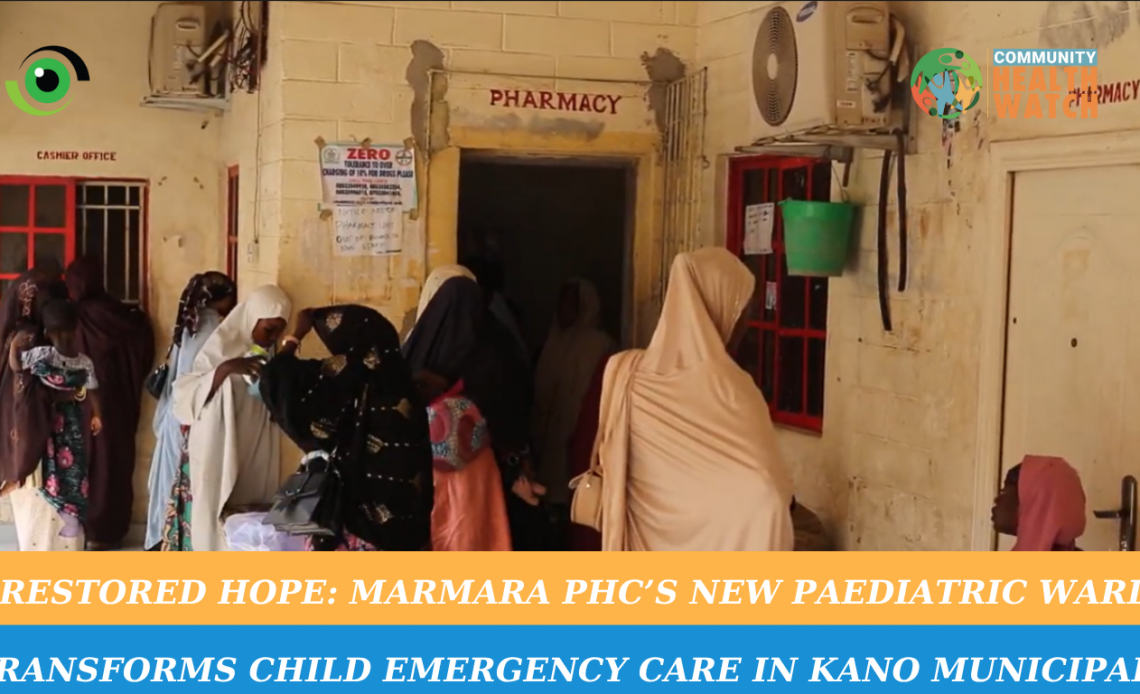In 2024, a Community Health Watch report covered by Nigeria Health Watch revealed the absence of a functional paediatric ward at Marmara PHC, Kano State forcing many families to shuttle between multiple health facilities in search of emergency care. However, following the construction of the paediatric ward, the centre now attends to 300 children daily from distant communities and even as far as Niger Republic, attracted by improved services and free essential medicines.
When Zahra’u Abubakar rushed her unconscious son from Sauna-Kawaji through a series of hospitals in Kano, she was fighting against time in desperation. “We went to Sir Sanusi General Hospital, but there was no bed. Hasiya Bayero Paediatric Hospital kept us for hours before referring us to the Marmara facility,” she narrates. “When we came here, they took him in immediately. The doctor even helped us get blood quickly, that’s what saved his life.”

Her account reflects the experience of many caregivers who now rely on Marmara PHC as the first place where rapid action restores hope.
Four months after the new ward was commissioned, Dr Saka Surajideen, the officer-in-charge, disclosed that the centre attends to over 300 children daily, free of charge. “We have administered above ₦20 million worth of free medication,” he said, adding that “before, we would just stabilise patients and refer them elsewhere. Now we admit them and treat them right here.”

But challenges persist. “Sometimes, a single nurse manages 18 beds at night,” he adds.
Paediatric nurse RM Zahriyya Dayyib shares, “We receive patients from as far as Niger Republic and from many communities across Kano State. We need more staff and more beds.”
Chief Pharmacist Nafisa Zakariya also added that “drug supplies run out before month-end. This is due to the surge of patients because of the improved infrastructure and service delivery. We need faster replenishment to meet the needs of the growing population.”

The paediatric ward demonstrates what Nigeria’s Health Sector Renewal Plan can achieve when investment reaches primary health centres: expanded capacity for emergency paediatric care, improved access to medicines, and a stronger frontline response for children..
Still, rising patient numbers, limited staff, and erratic drug supply are straining the facility. Without additional, predictable investment and systems strengthening, Marmara PHC risks being overwhelmed, threatening the gains made so far. Marmara PHC embodies the government’s push for equitable, quality primary healthcare, yet its challenges reflect deeper systemic gaps in workforce distribution, supply chain management, and service capacity.

The community is hereby calling for policymakers to;
- Deploy more nurses, laboratory staff, and clinicians to support service delivery.
- Strengthen drug supply chains to prevent stock-outs.
As Dr Surajideen notes, “Early diagnosis is key to treatment.” With sustained operational support, targeted investments, and improved systems, Marmara PHC can continue to give children not only treatment, but a fighting chance at life.



